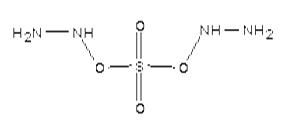What is Hydrazine sulfate?

Hydrazine Sulfate is a salt of the cation hydrazinium and the anion bisulfate (hydrogen sulfate), with the formula [N2H5+] [HSO4−] or N2H6SO4. It is a white, water-soluble solid at room temperature [1]. Hydrazine Sulfate is the synthetic sulfate salt of hydrazine, a derivative of ammonia and it appears as a white crystalline solid, which is obtained by neutralizing the base hydrazine with sulfuric acid.
Hydrazine sulfate is used in analytical chemistry for the gravimetric estimation of nickel, cobalt and cadmium and it is also used in the refining of rare metals as well as in the separation of polonium from tellurium. It finds application in the synthesis of chemical intermediate and organic compounds. Further, it acts as an antioxidant in soldering flux for light metals and as a precursor to hydrazine [2]. Also, it is used as a fungicide and antiseptic.
Some people also use hydrazine sulfate as medicine. Such as it is used for many types of cancer. Hydrazine inhibits the enzyme phosphoenol pyruvate carboxykinase, thereby blocking gluconeogenesis and this agent has been reported to decrease the excessive energy needs and cachexia of cancer patients. Classified as a likely human carcinogen, hydrazine sulfate is also a weak inhibitor of mono-amine oxidase [3]. It is also used for involuntary weight loss in people with cancer (cachexia or wasting syndrome), but there is no good scientific evidence to support these uses. Using hydrazine sulfate may also be unsafe. Hydrazine sulfate may block certain chemical reactions in the body that can lead to malnutrition and muscle wasting [4].
Hydrazine sulfate is toxic and potentially carcinogenic. Nevertheless, the short-term side effects reported in various clinical trials are relatively mild: minor nausea and vomiting, dizziness and excitement, polyneuritis (inflammation of the nerves) and difficulties in fine muscle control (such as writing). However, more serious, even fatal side effects have been reported in rare cases: one patient developed fatal liver and kidney failure, and another developed serious symptom of neurotoxicity. These side effects and other reports of hydrazine toxicity are consistent with the hypothesis that hydrazine may play a role in the toxicity of the antibiotic isoniazid, which is thought to be metabolized to hydrazine in the body.
Hydrazine sulfate is also a monoamine oxidase inhibitor (MAOI), and is incompatible with alcohol, tranquilizers and sleeping pills (benzodiazepines and barbiturates), and other psycho-active drugs, with pethidine (meperidine, Demerol), and with foods containing significant amounts of the amino acid breakdown product tyramine, such as aged cheeses, raisins, avocados, processed and cured fish and meats, fermented products, and others [1].
References
[1] https://en.wikipedia.org/wiki/Hydrazine_sulfate
[2] https://www.alfa.com/en/catalog/A10792/
[3] https://pubchem.ncbi.nlm.nih.gov/compound/24842
[4] https://www.webmd.com/vitamins/ai/ingredientmono-172/hydrazine-sulfate
You may like
See also
Lastest Price from Hydrazine sulfate manufacturers

US $0.00/KG2025-04-21
- CAS:
- 10034-93-2
- Min. Order:
- 1KG
- Purity:
- 98%min
- Supply Ability:
- 30tons/month

US $100.00/KG2025-04-21
- CAS:
- 10034-93-2
- Min. Order:
- 1KG
- Purity:
- 99%
- Supply Ability:
- 10 mt


